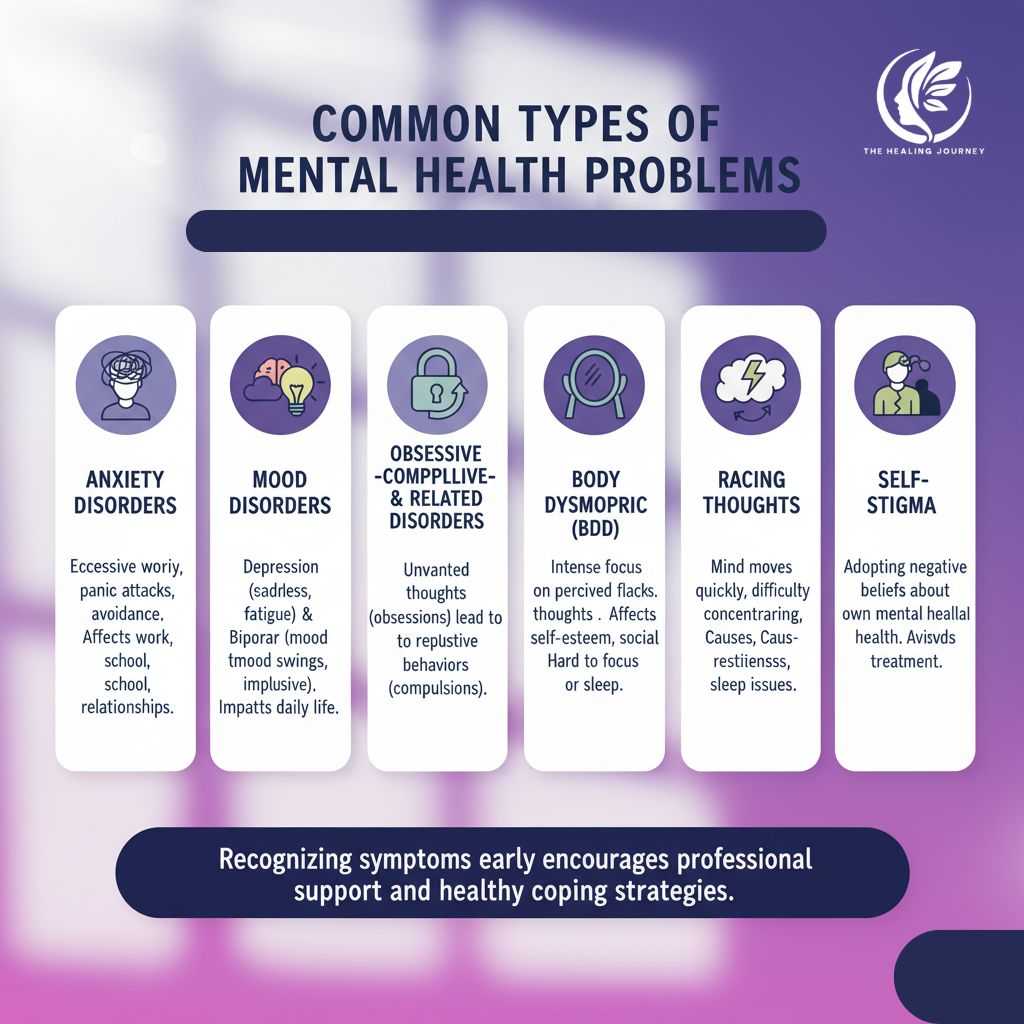Understanding examples of mental health problems helps us see how these conditions affect real people in their daily lives. Mental health issues can appear in many ways, from anxiety disorders and depression to obsessive thoughts or body image concerns. These conditions often disrupt emotions, behaviour, and relationships, but recognising the signs of mental illness is the first step toward recovery. By learning about common psychological disorders, such as mood disorders, OCD, or self-stigma, we can better support ourselves and others. This guide explains different types of mental disorders with simple, relatable examples and offers direction on how to find help and improve emotional well-being.
What Are Mental Health Problems?
Mental health problems affect the way we think, feel, and act. They can make it difficult to handle stress, relate to others, or perform daily tasks. These conditions are more common than most people realise, and they can happen to anyone at any age.
Understanding Mental Health Conditions
There are over 200 types of mental health conditions, ranging from common disorders like anxiety and depression to more complex conditions such as schizophrenia. Each condition shows up differently. For example, someone with depression may feel constantly tired, lose interest in activities, or struggle with sleep. A person with anxiety might experience constant worry, restlessness, or panic attacks.
How Mental Health Problems Appear in Daily Life
Mental health issues often show up in small ways before they become more serious. You might notice mood swings, trouble concentrating, overthinking, or negative thought patterns. Even everyday tasks, such as going to work, maintaining relationships, or keeping up with responsibilities, can feel overwhelming. Understanding these examples of psychiatric conditions can help you recognise symptoms early and seek support.
Why Recognising Mental Health Problems Matters
By learning about signs of mental illness, we can reduce self-stigma and support others who may be struggling. Awareness allows people to access professional help, such as counselling or therapy, which improves emotional well-being. Recognising mental health problems also encourages healthier habits and coping strategies, making it easier to manage stress, racing thoughts, or obsessive behaviours.
Common Types of Mental Health Problems
Mental health problems can appear in many ways. Everyone experiences thoughts and feelings differently, so that the same condition may look different in different people. Understanding common psychological disorders can help recognize symptoms early. This section explains some examples of mental health problems, their signs, and how they affect daily life.

Anxiety Disorders
Anxiety disorders include conditions like generalised anxiety disorder (GAD), panic disorder, and phobias. People with anxiety often feel excessive worry or fear that is hard to control. They may experience panic attacks, restlessness, or trouble sleeping. Anxiety can affect work, school, and relationships. For example, someone might avoid social events or public speaking because fear takes over. Recognising anxiety early can help people seek support and learn coping strategies to manage stress and racing thoughts.
Mood Disorders
Mood disorders include depression and bipolar disorder. Depression can cause persistent sadness, fatigue, and loss of interest in everyday activities. People may experience changes in their sleep patterns or appetite and struggle to concentrate. Bipolar disorder cycles between depression and mania. During manic phases, individuals may feel overly energetic, make impulsive decisions, or sleep very little. These mood changes can impact work performance and relationships. Understanding mood disorders helps reduce self-stigma and encourages people to get therapy or counselling for emotional well-being.
Obsessive-Compulsive and Related Disorders
Obsessive-compulsive disorder (OCD) involves unwanted thoughts (obsessions) that lead to repetitive behaviors (compulsions). For example, someone may check locks multiple times or wash hands frequently. These actions temporarily relieve anxiety but can interfere with daily life. OCD and related disorders show how mental health conditions can profoundly affect routines and decision-making. Identifying symptoms early allows for better management with professional support.
Body Dysmorphic Disorder (BDD)
An intense focus on perceived flaws in appearance characterizes BDD. They may constantly check mirrors, avoid social situations, or feel shame about how they look. This condition can affect self-esteem, relationships, and daily activities. Understanding BDD shows how mental health problems go beyond emotions; they also affect behavior and social interactions.
Rumination
Rumination involves constantly thinking about negative experiences or worries. People may replay events over and over in their minds, making it hard to focus or sleep. Rumination often occurs alongside anxiety or depression. Recognizing rumination helps people apply techniques such as journaling or mindfulness to ease stress and manage mental health better.
Racing Thoughts
Racing thoughts happen when the mind moves quickly from one idea to another. This can cause restlessness, difficulty sleeping, and trouble concentrating. Racing thoughts can appear during stress, anxiety, or bipolar disorder. Understanding this symptom helps people see patterns and seek strategies to slow down their minds.
Self-Stigma
Self-stigma happens when people adopt negative beliefs about their own mental health problems. They may feel shame or avoid treatment because of fear or judgment. This can make conditions worse over time. Recognizing self-stigma is essential. Awareness encourages people to seek counseling or therapy, thereby improving their emotional health.
Mental health problems affect thoughts, feelings, and behavior in ways that impact daily life. Anxiety, depression, OCD, BDD, rumination, racing thoughts, and self-stigma are common examples. Understanding these examples of psychiatric conditions helps people notice signs early. It also encourages seeking professional support, like counseling or therapy, and using healthy coping strategies.
Why These Examples Matter
Understanding examples of mental health problems helps people recognize signs early. Many conditions start subtly, like overthinking, mood swings, or trouble sleeping. Recognizing these signs can prevent issues from worsening.
Recognizing Symptoms Helps You and Others
When you know what common psychological disorders look like, you can support yourself and those around you. For example, spotting anxiety or depression in a friend allows you to encourage them to seek help. Recognizing symptoms of mental illness also reduces self-stigma. People feel less ashamed and more willing to access counseling or therapy.
Early Awareness Leads to Better Support
Mental health problems can affect daily life, work, and relationships. Early awareness gives people time to try coping strategies, build healthy routines, and reach out to professionals. This can include therapy, life coaching, or self-care practices. Understanding mental health conditions like OCD, BDD, or rumination shows that support is available and effective.
Mental Health Knowledge Promotes Well-Being
Learning about examples of psychiatric conditions improves emotional health for everyone. It encourages empathy, reduces judgment, and spreads awareness about mental health. By knowing the signs and types of mental disorders, people can take small steps to improve their emotional well-being and maintain a balanced lifestyle.
What You Can Do
Dealing with mental health problems can feel overwhelming, but there are clear steps to take. Recognizing the signs is the first step. After that, small actions can make a big difference in managing emotional health.
Track Your Patterns
Start by noticing your thoughts, emotions, and behaviors. Keep a simple journal to record moments of anxiety, rumination, or mood changes. Tracking patterns helps you understand triggers and identify which situations exacerbate your symptoms. Awareness is a key part of managing mental health conditions like anxiety, depression, or OCD.
Practice Self-Compassion
It’s common to feel guilty or ashamed about mental health struggles. Self-stigma can make things more complicated. Treat yourself kindly, remind yourself that mental health problems are common, and focus on progress, not perfection. Positive self-talk can reduce negative thinking patterns and improve emotional well-being.
Seek Professional Support
Counseling, therapy, or life coaching can offer guidance and tools to help individuals cope with symptoms. Professionals help you understand your mental health, develop healthy coping strategies, and address issues like body dysmorphic disorder, rumination, or racing thoughts. Seeking help early can improve your daily life, relationships, and overall mental health. Book an appointment today with a qualified professional to start your path toward better emotional well-being.
Build Healthy Routines

Small daily habits strengthen emotional resilience. Regular exercise, good sleep, and balanced nutrition improve mood and reduce stress. Mindfulness, meditation, or breathing exercises help calm anxious thoughts and ease racing minds. These practices complement professional support and foster long-term mental well-being.
Support Others
Knowing about mental health problems also helps you support friends, family, or colleagues. Recognizing common psychological disorders and symptoms encourages empathy. Encouraging someone to seek professional help or simply listening can make a big difference in their recovery.
Conclusion
Mental health problems are common, and they affect thoughts, emotions, and behavior. Understanding examples of mental health problems, from anxiety and depression to OCD, BDD, rumination, and racing thoughts, helps people recognize signs early. Early awareness encourages seeking support through counseling, therapy, or self-care practices.
Recognizing mental health conditions also reduces self-stigma and promotes empathy toward others. Small steps, like tracking patterns, practicing self-compassion, building healthy routines, and supporting friends, can make a big difference.
Learning about common psychological disorders empowers people to take action, improve emotional well-being, and lead more balanced lives. By paying attention to mental health, anyone can foster healthier habits and maintain stronger mental and emotional health.
Frequently Asked Questions (FAQs)
What are typical examples of mental health problems?
Common examples include anxiety disorders, depression, bipolar disorder, OCD, body dysmorphic disorder (BDD), rumination, and racing thoughts. These conditions affect emotions, behavior, and daily life. Recognizing symptoms early can help you seek support and improve your emotional well-being.
How can I tell if I have a mental health problem?
Look for changes in mood, behavior, or thoughts that last for weeks or months. Signs include persistent sadness, excessive worry, obsessive thoughts, trouble sleeping, or changes in appetite. Tracking these patterns and consulting a professional can help identify mental health conditions.
Can mental health problems affect daily life?
Yes. Mental health problems can impact work, school, relationships, and personal routines. Anxiety may cause avoidance of social situations, while depression can reduce energy and focus. Recognizing these signs helps you manage symptoms and maintain balance.
How can I support someone with a mental health problem?
You can support others by listening without judgment, encouraging them to seek professional help, and helping them notice patterns in their thoughts and behaviors. Showing empathy reduces self-stigma and improves emotional well-being.
What steps can I take to improve my mental health?
Start with small steps: track your thoughts and moods, practice self-compassion, establish healthy routines, try mindfulness or meditation, and consider seeking counseling or therapy. These actions help manage anxiety, depression, OCD, and other mental health conditions effectively.

One Response